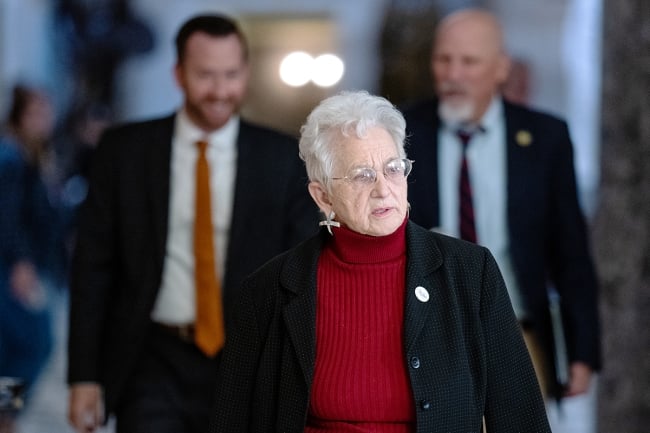You have /5 articles left.
Sign up for a free account or log in.

Expanding the Pell Grant to shorter-term career training programs is a top priority for North Carolina representative Virginia Foxx, who chairs the House Education and Workforce Committee.
Bill Clark/CQ-Roll Call, Inc./Getty Images
The House Education and Workforce Committee voted Tuesday in favor of a bill that would expand the Pell Grant to short-term career training programs that last between eight and 14 weeks, despite opposition from some higher education associations.
To pay for the expansion, the bill proposes cutting off federal student loans, starting next July, to about 50 or 60 wealthy colleges and universities that are subject to the federal endowment tax. The American Council on Education and other lobbying groups wrote in a letter to the committee that this offset would “represent an unprecedented and harmful shift in federal financial aid.”
Some committee members raised concerns about the offset during Tuesday’s markup. Virginia representative Bobby Scott, the committee’s top Democrat and a co-sponsor of the bill, acknowledged the concerns and opened the door to rethinking the offset. He said he’ll be looking for other ways to pay for the legislation, which authorizes $160 million in new spending over five years.
“One of the challenges we have in this committee is that we have limited jurisdiction,” Scott said of the offset. “We can cut school lunches, Title I formulas and other job-training programs. So we’re kind of limited in what we can do.”
The bill passed out of committee 37 to 8 and will now head to the House floor for consideration, though the specific timing is unclear—as is whether the legislation can pass the full chamber. The House will leave for its holiday break at the end of this week and return Jan. 9.
The Bipartisan Workforce Pell Act, backed by business groups including the U.S. Chamber of Commerce, was introduced last week after months of negotiations among the committee staffers on how to expand the Pell Grant to short-term programs. The bill’s sponsors argued that the expansion would help adults get the training they need to access better-paying jobs and compete in the modern economy.
The bill includes for-profit and online programs in the Pell Grant expansion, which has been a key sticking point in talks over the last several years. Senate Democrats generally don’t favor including for-profit programs, and the upper chamber has its own bipartisan bill on short-term Pell, which excludes them. The Senate bill doesn’t target federal student loans at wealthy institutions to pay for the expansion, either.
“We were encouraged to see the bipartisan consensus that eligibility should be conditioned on outcomes, not by excluding providers based on modality,” the online Western Governors University wrote in a letter to the committee. “With exclusively online learning and hybrid learning options overtaking in-person learning as the predominant modality across higher education, policy that excludes online learners is increasingly counterproductive. Working adults pursuing education of any duration need the flexibility in time and place offered by high-quality online options.”
Passing a short-term Pell bill is a top priority for the committee’s Republican chairwoman, North Carolina representative Virginia Foxx.
In addition to the Pell legislation, the committee also approved a bill to reauthorize the Workforce Innovation and Opportunity Act, which includes funding to support skills-based training and programs at community colleges.
“We must continue to advocate for policies that develop vital workforce programs and help Americans move into in-demand jobs more quickly,” Foxx said in a statement. “I believe the measures passed today achieve this goal and ensure students and working Americans have the skills necessary for a changing economy.”
Some Democrats and Republicans on the committee expressed concern about the offset in the Pell bill, which could hurt the legislation’s chances on the full House floor and in the Senate. Wisconsin representative Glenn Grothman, a Republican, said it would be a “big problem” for the Medical College of Wisconsin, a private university subject to the tax.
“They believe as currently drafted that this pay-for would shut them down or drastically change the way they have to operate,” he said.
The offset wasn’t the only point of contention during Tuesday’s markup of the bill. Some Democrats on the committee took issue with the inclusion of for-profits and all-online programs in the expansion.
California representative Mark Takano, a Democrat, said he worried that the bill was “opening a Pandora’s box.”
“I fear the for-profit motive is too great and will pave the way for deceptive practices,” he said.
Scott defended including for-profits, saying the bill had strong quality control measures that would protect students.
Career Education Colleges and Universities, which represents the for-profit higher education sector, endorsed the bill in a statement.
“By including strict accountability measures that apply to all schools in all sectors, the bill ensures that only the highest quality schools will qualify,” CECU president Jason Altmire said in the statement. “CECU has long supported accountability measures that are fair and provide equal protection to students in every sector of higher education.”
Meanwhile, the Student Borrower Protection Center, an advocacy organization, slammed the bill’s passage out of committee.
“Make no mistake, this bill is an early holiday gift to the shady for-profit colleges and online tech companies that have been salivating at the chance to cash in on federal Pell dollars in order to pad their bottom line,” said Mike Pierce, executive director of the Student Borrower Protection Center, in a statement. “We know the playbook; we have seen it before. These programs make lofty promises, fail to deliver, and leave our most vulnerable students to pay the price.”




